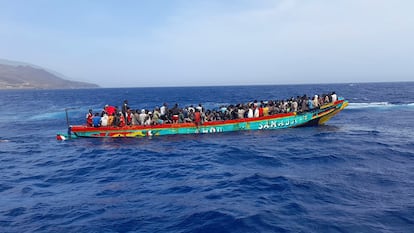EU countries reach deal putting them closer to new immigration pact
The last-minute agreement between Germany and Italy unblocks the quest to overhaul the system and address the migratory crisis at a time of heightened friction between member states


After years of negotiation, the 27 members of the European Union have closed the last chapter of the migration pact, one of the sources of greatest dispute in the EU in recent years. On Wednesday, the member states agreed on a “crisis regulation” for immigration that further restricts arrivals and asylum applications, according to the latest draft to which EL PAÍS has had access. This is the last leg of a long-awaited, comprehensive migration reform, which has been years in the making.
The meeting point between Germany, which had demanded more safeguards for families and minors, and Italy, which wanted tougher rules against the backdrop of its own political reality and a new surge in arrivals, allowed the new regulation to move forward just ahead of a summit that EU heads of state and government will hold in the Spanish city of Granada starting on Thursday. Now, this regulation and the other four parts that that are included in the long-awaited New Pact on Asylum and Migration will go to inter-institutional negotiation with the EU parliament in order to become a legal text.
The agreement comes at a time of particular strain between member states over fears of a migration crisis, and which has already led to temporary border closures and friction between partners. The Wednesday consensus facilitates the summit of European leaders in Granada, where the debate on immigration and the right models for managing it has crept into the agenda and is threatening to monopolize the entire meeting.
Spain, which currently holds the bloc’s rotating presidency and has been acting as mediator for this and other negotiations, had been optimistic about the possibility of clinching a deal. Spanish Interior Minister Fernando Grande-Marlaska had asserted that it would be achieved before the Granada summit, and so it was following a week of intense technical negotiations. Germany and Italy backed the regulation, while Poland and Hungary voted against. Austria and the Czech Republic abstained.
The text, which is part of a package that works as a whole, further restricts the acceptance of asylum applications and extends processing times (which opens the door to blocking them) in countries that declare that they are under a crisis situation. It also allows the detention time of asylum seekers to be lengthened. In addition, it includes the concept of “instrumentalization” of migration, when a country is the target of a deliberate attempt to destabilize it (or the entire EU) through the sudden massive arrival of migrants on its borders. This is what happened in the 2021 migration crisis, in which the regime of Aleksandr Lukashenko of Belarus sent (and helped try to cross) thousands of migrants towards the EU states on the eastern flank.
Human rights groups and those specializing in immigration have warned that this new regulation could create a gray area in which the rights of migrants are violated.
Sign up for our weekly newsletter to get more English-language news coverage from EL PAÍS USA Edition
Tu suscripción se está usando en otro dispositivo
¿Quieres añadir otro usuario a tu suscripción?
Si continúas leyendo en este dispositivo, no se podrá leer en el otro.
FlechaTu suscripción se está usando en otro dispositivo y solo puedes acceder a EL PAÍS desde un dispositivo a la vez.
Si quieres compartir tu cuenta, cambia tu suscripción a la modalidad Premium, así podrás añadir otro usuario. Cada uno accederá con su propia cuenta de email, lo que os permitirá personalizar vuestra experiencia en EL PAÍS.
¿Tienes una suscripción de empresa? Accede aquí para contratar más cuentas.
En el caso de no saber quién está usando tu cuenta, te recomendamos cambiar tu contraseña aquí.
Si decides continuar compartiendo tu cuenta, este mensaje se mostrará en tu dispositivo y en el de la otra persona que está usando tu cuenta de forma indefinida, afectando a tu experiencia de lectura. Puedes consultar aquí los términos y condiciones de la suscripción digital.








































